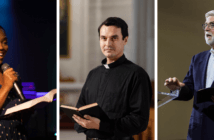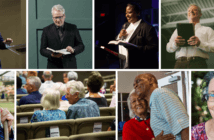In a very short period of time the Millennial generation will be the largest segment of clergy, says Wesley Theological Seminary President David McAllister-Wilson. Therefore, the key question for the church is no longer “How can we attract Millennials?” but rather “What kind of church will Millennials lead?”
As churches of all denominations struggle to turn around their aging congregations, a lot of hope is invested in attracting those born between 1982 and 2002. To some young visitors, an encounter with an old congregation may seem like an ecclesiastical zombie movie — the walking dead grasping for the living to survive. If I were a member of that generation, I’d run screaming.
Wesley Seminary has embarked on a major Lilly Endowment–funded research project to learn with faith communities how to build relationships, dream, and create with young adults. Together, teams from these congregations have formed the Wesley Innovation Hub, through which we are exploring not just what Millennials in our neighborhoods value and need but what we can build with Millennials. Because, in a very short period of time, this generation will be the largest segment of clergy. Instead of asking: “How can we attract Millennials?” we are asking “What kind of church will Millennials lead?”
1. Millennials are searching for a deep and authentic faith.
Kenda Creasy Dean, a leading researcher in youth and young adult ministry, has drawn some sobering conclusions about youth and young adults in mainline Protestant churches and why we lose them. In her book Almost Christian, she writes, “We’ve successfully convinced teenagers that religious participation is important for moral formation and for making nice people. What we have been less able to convey to young people is faith.”
The current form and practices of the institutional church are not working. It can’t be assumed that the faith Kenda talks about will come in the way it might have for previous generations. Like the second-generation Korean-American students in our seminary, Millennials honor the faith of their fathers and mothers but are looking for a faith that speaks to their hearts.
2. Millennials want to save the world, not the church.
The stereotype of this generation is legions of young college graduates who want to work for nonprofits or international nongovernmental organizations. I’ve seen many come to Washington, DC. But like all generations, Millennials are not all the same. Many enter the military and intelligence agencies with a post-9/11 desire to serve. Millennials are less liberal/progressive than the previous two generations at their same age. Yet some are the energy behind the new civil rights movements, such as Black Lives Matter. Many are the Dreamers, the children of undocumented immigrants. This is the generation of LGBTQ who will not stay in the closet. Millennials are the first generation since World War II who experienced a prolonged period of joblessness. They want to see change yet don’t trust established institutions to deliver. That includes the church.
3. Millennials have moved beyond the faith versus works debate.
The great debate that produced Protestantism was over the question of what is necessary for salvation. Martin Luther took his stand on sola fide, “faith alone.” We hear a distorted modern version of this from many people among my generation and older: “I come to church to be fed spiritually. I don’t want to hear about social issues from the pulpit. It’s fine for the church to do good work, but there are nonprofits that do that kind of thing. The focus of the church should be on building up faith.” But many Millennials don’t differentiate between building faith and doing good work.
Millennials as disruptive innovation
“The church is always just one generation from extinction.” This statement is so ubiquitous in Christianity the original source can’t be determined. But as Millennials rise to leadership they should consider that Christianity has within itself the capacity for its own renewal. Every new movement in Christianity grew as a new shoot on the old vine: from Saint Francis to Luther and Wesley; from the secret worship services of slaves to the church communities in Latin America who lead resistance movements to the cell churches in China. All have drawn from the inherently subversive message of the gospel.
The millennial generation is itself a disruptive innovation. The challenge for the last act of the retiring baby boomer generation of seminary and church leaders is determining how to enable and empower this generation to disrupt us.
This article is adapted from David McAllister-Wilson’s book A New Church and A New Seminary: Theological Education Is the Solution (Abingdon Press, 2018). Used by permission. The book is available at Cokesbury and Amazon.
Related Resource
- Millennials Seek Larger Framework to Understand God by Chris Folmsbee
- Think Bigger: The Challenge of Reaching Millennials by David McAllister-Wilson







